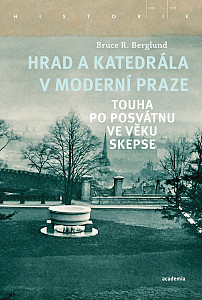Nalezené produkty
Nalezené kategorie
Nalezení autoři
Nalezené články: 140
Košík
je prázdný
je prázdný
Castle and Cathedral in Modern Prague: Longing for the Sacred in a Skeptical Age
Bruce R. Berglund
Cena v prodejně:
499 Kč
Cena při objednávce v e-shopu:
-50 Kč
449 Kč
U dodavatele
130-140ks na objednávku.
V prodejně do 3 dnů
K vyzvednutí pá 17.5 13:00
Odesíláme do 3 dnů
od 59 Kč, dodání po 20.5
Kdy můžu zboží mít?
Produkt je u dodavatele, odesíláme ho ihned po naskladnění.
Osobní odběr | ||
| Prodejna Benešov - ZDARMA | pá 17.5 | |
Výdejní místa | ||
| WEDO Pobočky, AlzaBox | 59 Kč | po 20.5 |
| Balíkovna | 79 Kč | po 20.5 |
| Zásilkovna | 69 Kč | po 20.5 |
| Česká pošta - Balík Na poštu | 99 Kč | po 20.5 |
| Zásilkovna SK | 95 Kč | út 21.5 |
Dodání na adresu v ČR | ||
| Stažení online | 0 Kč | pá 17.5 |
| WEDO doručení na adresu | 65 Kč | po 20.5 |
| Zásilkovna - domů | 99 Kč | po 20.5 |
| Česká pošta - Balík Do ruky | 119 Kč | po 20.5 |
| Zásilkovna SK - domů | 139 Kč | út 21.5 |
Uvedený termín u dodání domů a na výdejní místa je orientační. Balíček může přijít v rozmezí dvou dní po termínu.
Prague in the early twentieth century was the city of cubists, surrealists, and the Good Soldier vejk. This book takes a new approach to interwar Prague by identifying religion as an integral part of the city s cultural history. As Prague emerged as a modern city and the Czech nation gained independence, Catholics, Protestants, and those who imagined a non-sectarian religion debated questions of faith and morality. Contrary to the conventional view of modern Czech elites as atheistic, Berglund shows how they were deeply concerned with the place of religion in modern life.
Based upon a wide array of sources, the monograph explores the linkages between politics, theology, and architecture in the building of new symbols and a civil religion for the first Czechoslovak republic (1918-1938). Berglund views the contest of the sacred and secular in Prague within the broader context of religious change in twentieth-century Europe. His book lays a foundation for understanding both Czech culture of the interwar period as well as the nation s and Europe s religious history in the modern age. The author takes an approach that is both interdisciplinary and biographical by focusing on important figures in the politics and culture of interwar Prague, including Tomá Masaryk, the philosopher who became Czechoslovakia s first president; his daughter Alice, founding director of the Czechoslovak Red Cross; and Joze Plecnik, the Slovenian architect who directed the renovations of Prague Castle and designed one of the city s most renowned churches. This study of the beliefs and doubts held by these and other figures shows the transition from a (mostly) Catholic tradition to a new religious conception that was modern, humanistic, and detached from any institution much like the religious beliefs held by many Europeans today.
| EAN | 9789637326431 |
|---|---|
| ISBN | 978-963-7326-43-1 |
| Rozměry | 228 x 155 x 21 mm |
| Hmotnost | 512 |
| Datum vydání | 04. 05. 2018 |
| Vazba | brožovaná vazba |
| Počet stran: | 372 |
| Nakladatelství: | Central European University Press |
| Jazyk: | anglicky |
© 2024 Knihkupectví Daniela




